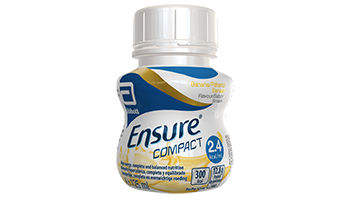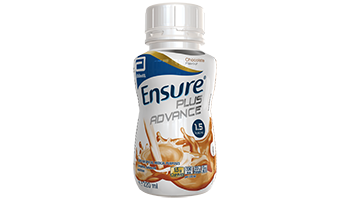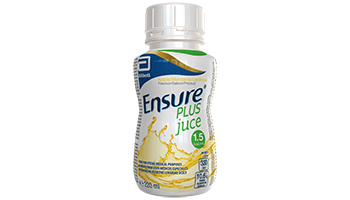THE VITAL CHOICE FOR IMPROVED TOLERANCE*1
VITAL 1.5KCAL
Vital 1.5kcal is designed specifically to support the nutritional needs of patients with disease-related malnutrition and malabsorption, or for those who experience symptoms of poor feed tolerance.
Vital 1.5kcal has been clinically proven to improve nutritional status and reduce gastrointestinal (GI) symptoms.1
- The UK's most trusted peptide-based feed†
- 100% peptide-based
- 1.5 kcal/ml
- Highest percentage of fats as MCTs (64%) in a 1.5kcal/ml peptide-based ONS‡
- 98% compliance in adults with impaired GI function§2
- Available in 3 delicious flavours: café latte, mixed berry and vanilla
- Best tasting peptide-based ONS¶3
- Gluten free and clinically lactose free
- Suitable for vegetarian,^ Halal and Kosher# diets
Vital 1.5kcal is available as both a ready-to-drink 200 ml ONS and as a 1000 ml ready-to-hang tube feed, both of which attach directly to Abbott giving sets.
![]()
ASK YOUR PATIENTS ABOUT GI SYMPTOMS EARLY
8.5% of patients experience gastrointestinal symptoms prior to ONS initiation.**4
This consensus guide provides practical guidance on identifying and managing symptoms of GI intolerance in your patients.
DOWNLOAD THE GUIDE
![]()
DESIGNED FOR COMPLIANCE AND CONTINUITY
Vital 1.5kcal is available in two formats for oral, bolus, gravity, or tube feeding,†† and is the:
98% compliance in adults with impaired GI function§2
Best tasting peptide-based ONS¶3
Only peptide-based ONS available in three flavours
![]()
CHOOSE VITAL 1.5KCAL TO REDUCE GI SYMPTOMS*
Clinically proven to improve nutritional status and decrease symptoms in 12 weeks1
Highest % of fats as MCTs in a 1.5kcal/ml peptide-based ONS‡
75% improvement in symptoms of GI intolerance*1
![]()
LEARN MORE ABOUT HOW VITAL 1.5KCAL IMPROVES PATIENT OUTCOMES


CLINICAL STUDY ON VITAL 1.5KCAL
Vital 1.5kcal has been clinically proven to improve nutritional status and decrease GI symptoms.*1
- 69% improvement in nutritional status (‘MUST’ score)
- 75% improvement in symptoms of GI intolerance (no or improved pain)


VITAL 1.5KCAL: CASE STUDIES
These case studies showcase the significant benefits of Vital 1.5kcal in improving patient outcomes. Through enhanced nutrition, each example highlights the role of Vital 1.5kcal in supporting patients ’ health and quality of life.
Features
Suitable for
| Suitable for
| Suitable for
| Clinically
| Gluten free |
|---|---|---|---|---|
| √# | √ | √^ | √ | √ |
#Please note, mixed berry flavour is not suitable for Kosher diets.
^Vitamin D is synthesised from cholesterol, extracted from the grease in wool sheared from live sheep. Mixed berry flavour contains E120 (cochineal) which some people may consider to be a meat product.
Nutrition
Vital 1.5kcal is a Food for Special Medical Purposes, for use under medical supervision.
Nutrition | Per 100 ml | Per 200 ml |
|---|---|---|
Energy | 631 kJ / 150 kcal | 1262 kJ / 300 kcal |
Protein | 6.75 g | 13.50 g |
Preparation
Vital 1.5kcal oral nutritional supplement is best served chilled.
RELATED PRODUCTS

Ensure Compact
Ensure Compact is a 125 ml, ready-to-drink, nutritionally complete§ oral nutritional supplement for people with, or at risk of developing, disease-related malnutrition. Its small volume has been specially developed for people who have difficulty drinking larger volumes or who have a poor appetite. Each easy-to-open Ensure Compact bottle1 provides 300 kcal (2.4 kcal/ml) and 12.8 g of protein. Ensure Compact is available in 4 delicious flavours; banana, café latte, strawberry and vanilla. §Nutritionally complete for vitamins and minerals in 625 ml (excluding sodium, potassium, chloride and magnesium). Calculated using the UK Reference Nutrient Intake for men aged 19-50 years.

Ensure Plus Advance
Ensure Plus Advance is a 220 ml, ready-to-drink, oral nutritional supplement (ONS) formulated specifically for older adults who have, or are at risk of, malnutrition. It’s our most advanced ONS yet, with each bottle providing 330 kcal (1.5 kcal/ml), 20 g of protein, 13 μg of vitamin D (500 IU), 499 mg of calcium and 1.5g of CaHMB (calcium-β-hydroxy-β-methylbutyrate). Ensure Plus Advance is available in 5 delicious flavours: banana, chocolate, coffee, strawberry and vanilla.

Ensure Plus Juce
Ensure Plus juce is a 1.5 kcal/ml, ready-to-drink, juice style oral nutritional supplement for people with, or at risk of developing, disease-related malnutrition. Ensure Plus juce is best served chilled and is available in six flavours: apple, fruit punch, lemon and lime, orange, peach and strawberry. It's presented in a 220 ml bottle with a peel-off seal for pouring.
RELATED CONTENT
Vital 1.5kcal Case Study: Rupert
Rupert is a 65 year old male with Ménière’s disease, chronic obstructive pulmonary disease (COPD), depression, angina and previous history of transient ischaemic attacks (TIAs).
- Logo
-

- Main Image
-

- Tagname
- CASE STUDY
- Logo link
- title
- Vital 1.5kcal Case Study: Rupert
- Content Reference
- /content/an/hcpproconnect/uk/en/home/adult/resources/public/vital-1-5-kcal-cs-rupert-v2
- Abstract
-
Rupert is a 65 year old male with Ménière’s disease, chronic obstructive pulmonary disease (COPD), depression, angina and previous history of transient ischaemic attacks (TIAs). Rupert was admitted to hospital with gastroenteritis and poorly controlled angina. He develop loose stools (type 7 on the Bristol Stool Chart) which persisted for four weeks and Metronidazole was prescribed for suspected C.difficile. His loose watery stools persisted and after a flexible sigmoidoscopy and colonoscopy were performed, Rupert was diagnosed with non-infective gastroenteritis and colitis. Codeine phosphate, Citalopram, Omeprazole, Prednisolone were trialled during this time. Rupert was only managing to consume a quarter of his meals and was prescribed whole protein oral nutritional supplements (ONS).
- Publish Date:
- July 2020 | 5 min
Vital 1.5kcal Case Study: Sue
Sue is a 42 year old female patient with a subtotal colectomy and ileostomy.
- Logo
-

- Main Image
-

- Tagname
- CASE STUDY
- Logo link
- title
- Vital 1.5kcal Case Study: Sue
- Content Reference
- /content/an/hcpproconnect/uk/en/home/adult/resources/public/vital-1-5-kcal-cs-sue-v2
- Abstract
-
Sue is a 42 year old female patient with a subtotal colectomy and ileostomy. She was admitted to hospital with chronic diarrhoea, and investigation showed evidence of ulceration of the ileosigmoid anastamosis and terminal ileum. During this admission she had numerous medical interventions such as steroid therapy, blood and ferritin transfusions, diuretics and a trial of Creon. She was fed via nasogastric (NG) feeding tube as she was only consuming half of her meals. Previously she had unsuccessfully trialled various whole protein oral nutritional supplements (ONS) and modular supplements, which she had felt exacerbated the diarrhoea.
- Publish Date:
- July 2020 | 5 min
Vital 1.5kcal Case Study: Arnold
Arnold is an 82 year old male patient with a ruptured oesphagus and dysphagia.
- Logo
-

- Main Image
-

- Tagname
- CASE STUDY
- Logo link
- title
- Vital 1.5kcal Case Study: Arnold
- Content Reference
- /content/an/hcpproconnect/uk/en/home/adult/resources/public/vital-1-5kcal-cs-arnold-v2
- Abstract
-
Arnold is an 82 year old male patient with a ruptured oesphagus and dysphagia. He is nil by mouth and reliant on tube fedding via a percutaneous endoscopic gastrostomy tube with a jejunal extension (PEG-J). His regular prescription for medication includes Ranitidine, Domperodone, Citalopram, Hyoscine patches, Carbocisteine, Lansoprazole, Zopiclone and Cyclizine. He lives at home and was experiencing loose stools up to 5 times a day with an urgency to pass stools.
- Publish Date:
- August 2016 | 5 min

Vital 1.5kcal Case Study: Sue
Sue is a 42 year old female patient with a subtotal colectomy and ileostomy.

Vital 1.5kcal Case Study: Arnold
Arnold is an 82 year old male patient with a ruptured oesphagus and dysphagia.

Vital 1.5kcal Case Study: John
John is an 80 year old gentleman who was admitted to hospital for an elective mitral valve repair (MVR) and quadruple coronary bypass graft (CABG).
Footnotes:
GI - Gastrointestinal
MCT - Medium chain triglycerides
ONS - Oral nutritional supplement
‘MUST’ - Malnutrition Universal Screening Tool
*In an observational study conducted across 19 medical sites in Spain, adults (≥18 years) with gastrointestinal (GI) impairment were prescribed Vital 1.5kcal as part of routine clinical practice. GI impairment was defined as compromised tolerance by the presence of symptoms such as diarrhoea, nausea, vomiting, bloating, or early satiety. Over 12 weeks, patients experienced improvements in tolerance, including reduced GI symptoms, improved stool consistency, and a reduction in abdominal pain.
†Based on UK prescriptions for peptide-based feeds (both ONS & tube feed) over a 12 month period (May 2024-April 2025).
‡Vital 1.5kcal provides the highest proportion of fat as MCTs in the UK 1.5kcal/ml peptide-based ONS category, with 64% of total fat as MCTs, compared to 60% in Peptisip Energy HP and 50% in Survimed OPD 1.5kcal Drink.
§Vital 1.5kcal ONS was given to 35 adults twice a day for 16 days. The average proportion of product consumed was 98%.
¶Based on independent taste test research involving 108 adults, comparing Vital 1.5kcal vanilla flavour, Peptamen Vanilla Bottle and Survimed OPD Drink.
^Vitamin D is synthesised from cholesterol, extracted from the grease in wool sheared from live sheep. Mixed berry flavour contains E120 (cochineal) which some people may consider to be a meat product.
#Please note, mixed berry flavour is not suitable for Kosher diets.
**Data from a longitudinal GP database. 8.5% of patients had experienced at least one symptom (including vomiting, diarrhoea or nausea) during the two weeks before receiving their ONS prescription.
††Both presentations attach directly to Abbott giving sets.
References:
1. López-Medina JA et al. Nutrition 2022;102:111734.
2. Nelson JL. Clin Nutr Exp 2019;28:123-130.
3. Ozcagli T et al. Clin Nutr 2014;33(1):S212.
4. Data on File. Abbott Laboratories Ltd, 2013 (Cegedim data).




